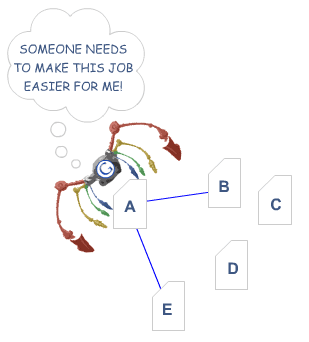Using Internal Links to Improve SEO

Internal links are hyperlinks that point to a target destination on the same domain – basically, links that direct visitors from one page to another on the same website. For best search engine ranking, internal links should always use descriptive anchor text (the text that describes the link) that is rich with keywords.
The Purpose of Internal Links
Internal links serve as navigational tools within a website, allowing visitors to easily visit related content. Internal links may also help define information hierarchy, and they spread “link juice,” or link rank importance, around a website.
How to Use Internal Links
Search engines use “spiders” to explore the web; these programs crawl websites like spiders, following each link like a thread on a spider web. It is therefore important for websites to provide ample internal links, so that search engine spiders can easily discover every page on the site.
The image above shows Google’s spider at Website A. Internal Pages B and E are well linked, but Pages D and C are hidden from the spider’s view. No matter how well they’re optimized or marketed, pages D and C will not be recognized or indexed by Google. This is bad SEO practice.
SEO Best Practice
Ideally, your website should be logically organized like a pyramid, where all subjects and sub-subjects trickle down from the homepage (the largest dot):

The above pyramid is also good SEO practice because it has the fewest links, or connections, between the homepage and child pages. Having minimal links allows a website’s “link juice,” or page importance as ranked by the search engines, to trickle down from the homepage to its child pages. The more convoluted the structure, the more diluted the link juice.
Formatting Internal Links
Internal links have the same structure as any hyperlink:

Search engines understand this link format, and will follow the link to index the referenced page. Search engines will also use the hyperlink to calculate other variables, such as mozRank.
Search engine spiders cannot follow all links. Be careful not to internally link in formats unfriendly to search engines:
- Links accessible only via forms that require submission
- Pages that are not internally linked, but rather are discovered only via a site search
- Links built with Javascript, or embedded within Java applets, Flash or other plug-ins
- Links to pages that are manually blocked by the Robots.txt file or Mega Robots tag
- Links in frames or I-frames
- Links buried on a page with more than 150 links

